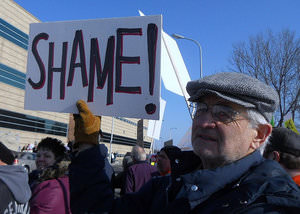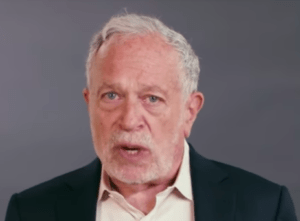American Officials Enjoy Lives Without Shame
Three recent news headlines illustrate how shameless some American officials have become when it comes to breaking the rules or messing up and pretending that everything is still OK. They also prove that in modern America, it’s possible for screwups to continue their lives and careers with hardly a blip.Three recent news headlines illustrate how, in modern America, it's possible for some well-placed screwups with the right connections to continue their lives and careers with hardly a blip.
Once upon a time, there was a specific word to describe the misdeed of an officeholder or custodian of trust who had betrayed his or her duties: malfeasance.
That word, originating from ancient Latin, can be translated into modern English to mean a “bad doing.”
If you believe the old tales, malfeasance once was an offense that carried stiff penalties: public humiliation, social ostracism, and civil or criminal sanctions.
And in traditional cultures with shame, a disgraced official would resign — or worse.
No longer, it seems.
Three recent news headlines allege some pretty horrifying behavior and illustrate how shameless some American officials have become when it comes to breaking the rules or messing up and pretending that everything is still OK. They also prove that in modern America, if you have the right connections, it’s possible for screwups to continue their lives and careers with hardly a blip.
The Bureau of Alcohol, Tobacco, Firearms and Explosives was recently rocked by a massive scandal: reports that its agents had helped transport approximately 2,000 powerful weapons into Mexico — weapons that were then “lost.” The Los Angeles Times called it an “illegal trafficking program,” although the Fast and Furious operation, at it was dubbed, was ostensibly designed to allow law enforcement to track the guns back to drug cartels. Instead, it apparently turned into a U.S. government-sponsored armament program for some of the worst killers in the world.
On Tuesday, Kenneth Melson, the man who led the ATF during the term of this operation, was allowed to leave his position and move into the ATF’s Office of Legal Policy. Meanwhile, a couple of weeks ago, the ATF allowed agent William McMahon to make a similar move — landing him a job as deputy assistant director in charge of internal investigations, according to the L.A. Times. During the gunrunning program, McMahon was the supervisor of the agency’s Western operations, including the Phoenix field office, which was one of the central hubs of Fast and Furious. Two of McMahon’s subordinates who more directly oversaw the failed program were also allowed to switch to different departments in the ATF — moves that at least some observers said were promotions.
McMahon recently told a House committee: “I share responsibility for mistakes that were made.”
Not a big deal, I guess. Nothing to see here. Move along, people.
Exposing a similar shocker, on Aug. 17, the brilliant reporter Matt Taibbi wrote an article in Rolling Stone in which he outlined allegations made by a U.S. Securities and Exchange Commission whistle-blower that for years the regulatory agency has been quietly destroying potential evidence against banks.
The allegations center around cases in which the SEC would open preliminary investigations, collect irreplaceable evidence and then close the cases and simply destroy documents.
Sen. Chuck Grassley, R-Iowa, was quoted in Forbes saying, “It doesn’t make sense that an agency responsible for investigations would want to get rid of potential evidence. If these charges are true, the agency needs to explain why it destroyed documents. … ”
Meanwhile, the SEC has been for a long time a “revolving door” for industry insiders, with investigators being offered plush jobs at the very firms they were supposed to have regulated. From 2006 to 2010, 219 former SEC employees filed statements indicating that they were now representing a private client before the SEC, according to a study by the Project On Government Oversight. One employee filed “within two days of leaving.” According to POGO, many other former SEC employees may have simply ignored the reporting requirement after landing their big-ticket jobs.
Coincidence? And these people are the guardians of our entire financial sector?
Finally, there is the matter of the University of Miami and the NCAA. According to Yahoo Sports, jailed Ponzi schemer and Miami booster Nevin Shapiro has detailed a long list of troubling misconduct stretching from 2002 to 2010. According to the L.A. Times, Shapiro’s allegations include a list of forbidden gifts to athletes that sounds like a king’s ransom: “Jewelry, clothing, travel, televisions, house/yacht privileges and strip clubs.”
And the reason this is particularly shocking? Many of these abuses allegedly occurred during the watch of Paul Dee, who served as Miami’s athletic director from 1993 to 2008. Dee’s latest job?
Chairman of the NCAA committee on infractions — the same committee that crucified the University of Southern California with harsh sanctions while insisting that responsibility for infractions should be inferred up and down the university’s chain of command. “Institutional control,” Dee’s committee called it.
Perhaps ironically, the new allegations by Shapiro are not the first time Dee has been accused of failure as an overseer.
Around 1995, Dee was wrapped up in a major scandal at Miami, with ESPN magazine accusing him of “[suspending] critical parts of what had been a rigorous drug-testing policy” and then being appointed to “investigate why the athletic department ignored its own drug-testing policy, a mess to which he was a central party.”
Meanwhile, an underling in his athletic department was sentenced to three years in prison for coordinating “more than $128,000 in fraudulent Pell Grants to 57 players.”
Right. Let’s put this guy in charge of NCAA investigations.
People are allowed to make mistakes. And I don’t believe in silly doctrines like zero-tolerance or police-state surveillance.
But individuals who have previously displayed poor judgment or a lack of oversight should not be placed in charge of investigations, and institutions with a culture of corruption occasionally must be rebooted from zero.
In a culture where shame is passé, we must ask often: Who is watching the watchers?
Your support matters…Independent journalism is under threat and overshadowed by heavily funded mainstream media.
You can help level the playing field. Become a member.
Your tax-deductible contribution keeps us digging beneath the headlines to give you thought-provoking, investigative reporting and analysis that unearths what's really happening- without compromise.
Give today to support our courageous, independent journalists.









You need to be a supporter to comment.
There are currently no responses to this article.
Be the first to respond.